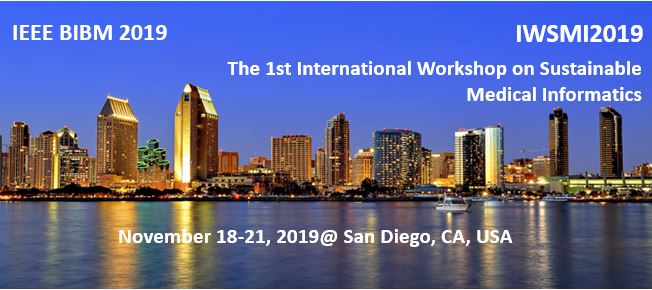International Workshop on Sustainable Medical Informatics

The 1st International Workshop on Sustainable Medical Informatics (IWSMI2019)
In conjunction with
IEEE International Conference on Bioinformatics and Biomedicine (BIBM2019)
This workshop entitled “The 1st International Workshop on Sustainable Medical Informatics”, will focus on the sustainability of medical informatics, which falls into the category of global sustainable goal of health and wellbeing. Although plenty of research has been done in the area of medical informatics, it is unclear how sustainability goal is achieved in the research community. This issue becomes outstanding recently due to the fast-increasing medical data aggregated from different medical systems and medical devises/sensors, the need of intelligent medical diagnosis systems with improved accuracy of diagnosis, which is extremely helpful in rural places where there is a lack of doctors. Other auxiliary medical services such as remote medicine and personalised medicine also have impact on the improvements of health and wellbeing. However, their impact on its sustainability has not been well addressed. This workshop emphasises innovate research of medical informatics, cost-effective medical data (both clinical and non-clinical) acquisition and integration, advancement of intelligent medical system (e.g. intelligent diagnosis systems) to reduce the workload of doctors. Medical informatics security has also attracted the attention of the communities after several incidents in both developed (e.g. UK NHS Ransomware) and developing countries. Any advancement of the medical systems will be in vain if the medical records or diagnosis are compromised. This workshop also welcomes the research studies on medical diagnosis process modelling, vulnerability analysis, and security defence.
Possible topics include, but are not limited to:
- Medical Systems, including developing, implementing, refining and evaluating Hospital Information System (HIS), Laboratory Information Management (LIS) System and Picture Archiving and Communication Systems (PACS), as well as other medical records management systems.
- Medical diagnosis process modelling, medical system vulnerability analysis, attacking pathways identification, and security defence mechanism recommendation.
- Healthcare data science including data management, data modelling, data sharing and merging from different systems as well as its integration with medical devices/sensors, etc.
- Healthcare diagnosis system, such as cardiac arrhythmias, using decision theories involving algorithmic, statistical methods and/or machine learning methods, etc.
- Modelling and simulation in medicine, such as cardiac multi-scale modelling, for understanding disease and screening drugs.
Paper Submission
Please submit a full-length paper (up to 8 page IEEE 2-column format) through the online submission system (you can download the format instruction here (http://www.ieee.org/conferences_events/conferences/publishing/templates.html).
Papers should be submitted via
https://wi-lab.com/cyberchair/2019/bibm19/index.php
Important dates
- Sep 20, 2019: Due date for full workshop papers submission
- Oct 15, 2019: Notification of paper acceptance to authors
- Nov 1, 2019: Camera-ready of accepted papers
- Nov 18-21, 2019: Workshops
Organizers
Program Chairs
- Dr. Cunjin Luo, Key Lab of Medical Electrophysiology, Ministry of Education, China, cunjin.luo@yahoo.co.uk (primary); cunjin.luo@swmu.edu.cn
- Dr. Ying He, De Montfort University, UK, ying.he@dmu.ac.uk
- Dr. Dominic Whittaker, University of Nottingham, UK, dominic.whittaker@nottingham.ac.uk
Program Committee
- Prof. Alexander V. Panfilov, Gent University, Belgium
- Prof. Jinzhu Yang, Northeastern University, China
- Dr. Tingting Li, Imperial College London, UK
- Dr. Iryna Yevseyeva, De Montfort University, UK
- Prof. Tong Liu, Tianjin Medical University, China
- Prof. Lisheng Xu, Northeastern University, China
- Dr. Prapa Rattadilok, University of Nottingham Ningbo, China
- Dr. Qince Li, Harbin Institute of Technology, China
- Prof. Kuanquan Wang, Harbin Institute of Technology, China
- Prof. Henggui Zhang, University of Manchester, UK
- Prof. Helge Janicke, De Montfort University, UK